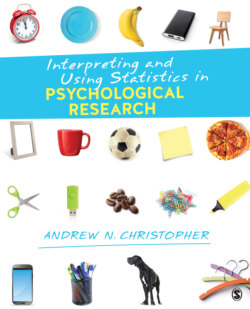Читать книгу Interpreting and Using Statistics in Psychological Research - Andrew N. Christopher - Страница 17
На сайте Литреса книга снята с продажи.
Illusory correlations
ОглавлениеTo start a discussion of the first of these two tendencies, take a look at these two poker hands of cards in Figure 1.2. Which one is a player more likely to be dealt? A hand of 10 through ace, all of the same suit, feels highly unlikely. However, in reality, the odds of getting that hand are no lower than the odds of getting the other, seemingly random, hand of cards. We are wired as human beings to detect patterns in the world, and so it is here. We feel as though the 10 through ace is a more unusual hand than the other hand of cards. Statistically, however, the odds of getting either one are the same. This is an example of an illusory correlation. By “illusory,” we mean “not real” or an “illusion.” By correlation, we mean an “association” or “connection” between two behaviors or events. Much as an optical illusion is seeing something that is not present, an illusory correlation is perceiving a relationship when no relationship exists (Fiedler, 2000). We want the world to be a predictable, orderly place. So our minds impose order and logic even when order and logic do not exist.
Illusory correlation: tendency to perceive a relationship when no relationship really exists.
Let’s discuss some additional examples of illusory correlations. In college, I had a roommate, Alex, who was not only a nice guy, but smart, too. Alex worked hard and never took his natural intellectual ability for granted. He did well in all of his classes, and he went on to become an immigration lawyer in South Florida. We were roommates for our entire college careers, and he is still a good friend to this day. I am sure this information does not impress you. But here is what might impress you. Take a guess as to why Alex did so well in college and beyond. His intelligence? His hard work? Those would be reasonable guesses. Ask Alex, however, and he will tell you something different. Let me explain. In our first year of college, we had our first round of tests about five weeks into the semester. We both had two or three tests that week. Of course, as would become the norm, Alex did well on these assessments. About five weeks later, we had our second round of tests and papers coming due. Because Alex had done so well on tests and papers earlier in the semester, I asked him for some study tips. Here is what he told me: He told me that I could not wear his pair of “lucky socks.” They were his lucky socks, and no one else could wear them. He had worn them every day during the week of our first round of tests and papers, and because he did so well, he was going to wear them again when tests and papers came due. Of course, I thought he was joking, but no, it quickly became clear that in his mind, the reason he did well on tests was because of his lucky pair of socks. By believing, albeit erroneously, that his pair of socks aided his performance on his tests, Alex was able to feel as though he had gained some control over his environment. The next time he had a test, he just needed to wear that same pair of socks again, and he would do well.4
Photo 1.9a and 1.9b Does a “lucky” charm really help us get good grades?
If you have ever played a sport or been involved in the performing arts, did you ever have some sort of pre-performance routine that you felt you had to follow? Just like my college roommate and his belief that wearing a certain pair of socks contributed to his academic success, some highly accomplished professional athletes have pre-performance routines that they follow. For instance, three-time Ironman champion Chrissie Wellington wrote the Rudyard Kipling poem “If” on her water bottles before each event. Similarly, professional baseball player Justin Verlander reportedly used to eat Taco Bell® (Yum! Brands Inc., Louisville, KY) the night before the games in which he was the starting pitcher. Is there really a relationship between writing a poem on a water bottle and performance in an Ironman event? How about between eating Taco Bell and pitching a baseball? I doubt it; however, for these athletes, they have come to make these connections in their minds.
Illusory correlations arise in part, as we said previously, from our need to detect order in the world. To satisfy this need, we tend to pay attention to instances that confirm this connection and disregard those instances that disconfirm that connection. Did my roommate ever do poorly on a test? Yes, actually, a few times he did. But in his mind, those exceptions had nothing to do with his socks. Did Chrissie Wellington win every race she competed in? No, but in her mind, she likely would have done even worse had she not written that poem on her water bottles. Indeed, once we establish relationships between events in our mind, they are difficult to dislodge.
